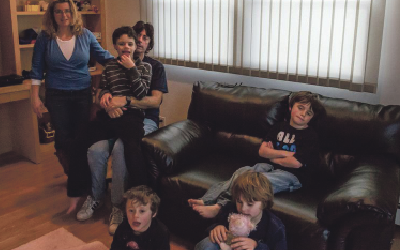If the Viscardi Center didn’t offer a house on its Albertson property after her family was left homeless by Hurricane Sandy, Kim Greengus said, she wouldn’t know what to do.
“Being able to move into this house is a lifesaver,” said Greengus, a mother of four whose 11-year-old son Bobby is autistic.
Greengus, her husband Todd and their four sons, were living in a hotel with Federal Emergency Management assistance while their Long Beach house was being rebuilt. The house had been flooded with four feet of water during the hurricane and 60 percent destroyed, Greengus said.
In late December, she said, FEMA’s housing assistance was about to run out and with the price of home rentals driven up in the wake of the storm the only alternative appeared to be a three-bedroom house for $7,000 a month, Kim Greengus said.
“It was like a ticking time bomb. I was on the phone every day with anybody who could help me,” Greengus recalled.
With no options in sight, Greengus contacted Charles Hammerman, president and CEO of The Disability Opportunity Fund, a non-profit organization which helps to find housing for people with disabilities.
Hammerman in turn reached out to The Viscardi Center about a house on its Albertson property that was not occupied.
The Viscardi Center, which offers services to educate and empower disabled children and adults, offered the family a house on its property as a temporary haven.
“When Charlie approached us, we agreed that it would be an excellent use of the house,” said John Kemp, president and CEO of The Viscardi Center. “We are already committed to helping people with disabilities and their families and actively assisting those affected by the storm through our relief fund.”
The Greengus family lost most of their furniture and belongings in the storm, so they also needed beds, household items, furnishings, and food.
Bob’s Discount Furniture donated furniture and Get Moving USA delivered it, so the house is now furnished. Donations from a variety of funds set up to provide assistance to those affected by the storm, including the Viscardi Relief Fund, allowed the family to purchase other basic necessities. The Disability Relief Fund assisted the Greengus family with the payments on the Albertson house.
When Hammerman first showed Greengus the Albertson house, Greengus recalled saying to herself, “Oh my God, it’s so nice.”
Her nine-year-old son Tommy immediately went outside and ran around the back yard, visibly elated, she said.
The night they moved in, on Jan. 13, she cooked a pot roast dinner with pots and pans that were among the things donated to her family.
“It was their first home-cooked meal in 13 weeks. At that point, they really appreciated mommy’s cooking,” she said of her four sons.
Seeking to minimize the disruption in their lives, she said she’s still sending her sons to their schools in Long Beach. It’s a challenging routine to get them all ready to board the school bus at 7 a.m. But living in a home of their own again, even temporarily, has had a profound effect on their lives.
“I definitely have peace of mind. This is a place where my kids can come home and be normal and be themselves,” Kim said. “I don’t have a lot now but I appreciate what we have and my kids do too.”
Living in the house on the Viscardi Center property has restored a sense of routine to the family, she said. The books in their house were lost in the storm, but Kim discovered the nearby Shelter Rock Library and has restarted he practice of reading to her children each night at bed time.
“Now that I’m here, I’m remember those things I would do with them,” she said.
The house they’re currently living in has been earmarked as a residence for disabled people by The Viscardi Center. Depending on when their Long Beach house is restored, they will either move back home or into another house on the Viscardi grounds on an interim basis, Greengus said.
Another non-profit group, Samaritan’s Purse, removed floors and debris from their Long Beach house. Reconstruction is continuing assistance from FEMA.
In the meantime, her sons, including Billy, 8, and James, 5, have a large backyard to play in when they get home from school each day. And they are finding it much easier to do their homework in a home of their own.
“This whole thing is a waiting game. We don’t know how long this will go on,” Greengus said.



